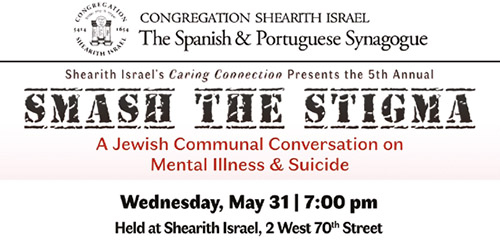
On May 31, Congregation Shearith Israel’s Caring Connection presented the 5th Annual Smash the Stigma: A Jewish Communal Conversation on Mental Illness and Suicide program.
The program is held annually during Mental Health Awareness Month and is co-sponsored by many community synagogues and Jewish institutions, including Active Minds|Yeshiva University; B’nai Jeshurun; Congregation Ohab Zedek; Congregation Rodeph Shalom; Darkhei Noam; Galim; the Jewish Board; the Jewish Center; Lincoln Square Synagogue; Manhattan Day School; Marlene Meyerson JCC Manhattan; NAMI-NYC; SAJ; Temple Shaaray Tefila; and West End Synagogue.
In the moving discussion, Amy Danziger Tenenbaum recounted the story of her sister, Beth Danziger Keyes, who she lost to suicide. Rabbi Lauren Grabelle Herrmann of SAJ spoke about her son’s struggles with depression and suicidal thoughts. Both Danziger Tenenbaum and Grabelle Herrmann discussed their families’ stories in order to bring awareness to mental health issues, in particular mental health stigma.
Referring to Pirkei Avot, Grabelle Herrmann stated that it is not up to us to complete the work, but we cannot walk away from it. We must break the stigma and create conversations to assist people in getting them the help which they need.
Two other panelists addressed the room during the evening: Dr. Nava Silton, a developmental psychologist, and Matt Kudish, chief executive officer of NAMI-NYC. NAMY-NYC helps those affected by mental illness through peer support, and its services are free of charge.
Both Silton and Kudish discussed ways in which we can recognize and address mental health issues.
Silton alerted the room to the acronym “IS PATH WARM,” which could aid people in recognizing warning signs of suicide. The acronym stands for: suicidal ideation, substance abuse, purposelessness, anger, trapped, hopelessness, withdrawal, anxiety, recklessness, and mood change.
With respect to the types of steps that communities can take to address mental health issues, Silton specifically referenced Galim (Grab a Lifeline in Manhattan), which is made up of a group of mental health professionals. Founded by Leora Botnick, a licensed clinical social worker, after she attended the first annual Smash the Stigma event, Galim was formed to address the Upper West Side Community’s mental health needs.
Kudish stated that if an individual is experiencing mental health issues, they should remember that many people struggle with such issues and that it is important to find someone to talk to.
As to mental health issues that people may see in others, Kudish noted that often we are afraid to inquire how others are doing because if a mental health issue does indeed exist we would not know what to do. Kudish emphasized that it is not “our job” to fix others’ issues, but we can support them and guide them to resources.
Kudish added that the simple act of taking a minute to think of who you know who might be struggling and sending that person a text to inquire how she or he is doing can be extremely meaningful.
Grabelle Herrmann also movingly referred to the Mi Sheberach prayer for healing, noting that in this prayer we daven for refuat hanefesh (healing of the soul) and refuat haguf (healing of the body) in one breath. In other words, Judaism recognizes that there are two integrated components of health, soul and body, which should not be thought of separately. If people normalize talking about mental health in their communities it can break down the bifurcation which exists and help reduce mental health stigma.
All of the panelists agreed that community programs such as this one are helpful to “smashing the stigma.”
For information concerning Galim, visit its website at galimuws.org. For information concerning NAMI-NYC, visit www.naminycmetro.org.
Judith Falk is the creator of the Upper West Side Shtetl Facebook group and can be found on instagram @upperwestsideshtetl. She is a lawyer by day and a former legal reporter.













